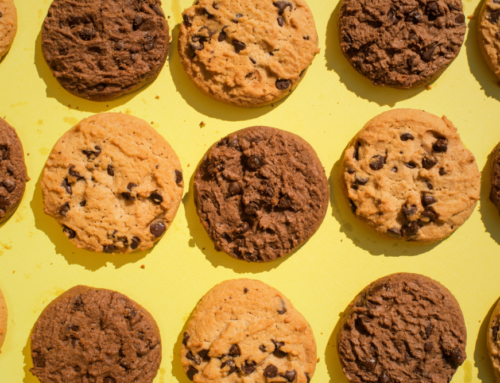 My last two On Nutrition columns, “What kind of eater are you? Can you eat just one” and “Eating right: When willpower just isn’t enough,” were prompted by a concept they both have in common, a concept I call Defaults & Delays.
My last two On Nutrition columns, “What kind of eater are you? Can you eat just one” and “Eating right: When willpower just isn’t enough,” were prompted by a concept they both have in common, a concept I call Defaults & Delays.
When you create default behaviors, you reduce the number of choices you have to make. Since the average person makes more than 200 food choices a day, reducing this number is a good idea, especially since our willpower wanes as the day goes on, especially if we’ve had a stressful day, are running short on sleep, or have had to make a number of other decisions (food related or otherwise) that day. Delays are a way of creating space between an impulse to eat (or do) something and the final action.
Defaults: Drawing A Line in the Sand
Here are some of my personal defaults:
- Coffee shops 1: I order drip coffee or an Americano (if I want less caffeine). If I want more milk I do a cappuccino instead of a latte. I never order sugary coffee drinks.
- Coffee shops 2: Never order a cookie, pastry or other treat. (I will occasionally, while I’m in line for my afternoon coffee, have thoughts along the line of, “Hmmm, that brownie looks good.” But then I remind myself that I don’t order coffee shop treats, I move along, drink my coffee, and have zero regrets.)
- Starbucks: If I need to buy a breakfast sandwich, I order one of the few selections that come on an English muffin, never anything that comes on a biscuit or croissant-type bun.
- Work lunches: Salads are my default go-to on days I don’t manage to bring lunch from home. One of my favorite made-to-order salad is from Mod Pizza. The thought of ordering pizza, or something like teriyaki or burgers from someplace else, never even crosses my mind.
- Restaurant desserts: My default is to not order dessert when dining out. Unless I am at a “destination restaurant,” which likely also coincides with travel, I don’t order dessert, because I have no room for it! This leads to…
- Dine in vs. take out: When I’ve fallen down on meal planning, or we simply feel too tired to cook, our default is to just suck it up and assemble a simple meal from what we have on hand (thanks, pantry staples). I can count on one hand the number of times we did some form of takeout in the past year, and have a few fingers left over. Adding to that, our restaurant meals are always based on advanced plans, not on momentary impulse.
I have a number of patients who work in offices where office treats have run wild. For them, a useful default is to just say no across the board to the doughnuts, cookies, pizza and candy that filter through. Ironically, my patients who are nurses are among the hardest hit by this! Far easier to decide “no office treats” than to have each day raise the “will I or won’t I” question.
If you think defaults sound restrictive, think again. It’s not that I never eat burgers or pastries or dessert, it’s simply that I plan for those indulgences. A planned weekend outing to get a really good burger or delicious pastry from an artisan bakery allows for rational forethought as well as the joy of anticipation! Studies show that people who plan their vacations in advance enjoy them more than people who take spur-of-the-moment trips, and anticipation is the key difference. I’m convinced it’s not different with food. I have a trip to France next month, and I thinking about what I will see and what I will eat is providing tremendous joy, and I haven’t even left Seattle.
If you think that defaults remove the element of choice, think again. When you set a default, you are pre-deciding. You are deciding that, for you, the smarter choice is to always do X in Y situation. Generally, you set defaults around scenarios that crop up daily (or very frequently). Honestly, do you really want to face the willpower tug of war every time you go get coffee or step into the office break room?
Delays: Creating Space to Make Better Choices
Delays are another tactic for making rational decisions when faced with temptation. A delay is anything that puts a gap between the impulse (to eat a particular food) and action (choosing whether or not to eat that food).
- Shopping cart 1: I don’t fall prey to impulse purchases at the grocery store, but for those who do, ordering groceries online and having them delivered may be a saving grace. First, you can make decisions when you are in a more rational state of mind. Second, research shows that when shopping online, we derive the most pleasure from selecting items and placing them in our cart, not from the actual purchase and acquisition of these items. That means that the cookies you put in your online cart today may not hold the same appeal when you review your cart before hitting the “order” button tomorrow. (This holds true for non-food items, too.)
- Shopping cart 2: I have a patient who enjoys putting chocolate in her cart when grocery shopping at a physical grocery store, but then she never ends up actually buying it. Again, the act of choosing what you like and (temporarily) saying, “Yes, I can have this” is enough.
- Waiting to pay: This delay is related to the first two, but unfortunately it’s unpredictable. Let’s just say you don’t have a default about whether you will have a treat with your coffee (and if you don’t, why not?). You walk in and pass the pastry case on your way to the register. You think “Oh, brownies! Yes I want a brownie!” If there is no line at the register and you are able to walk right up to the cashier, you may slide right into, “I’d like a brownie…and a tall Americano.” If you have to wait in line, that delay may allow you to change your mind and just order the Americano. Again, this is unpredictable, which is why I encourage setting a default if you are trying to keep your intake of sweet treats on the low side.
- Going for a walk: My husband tells me that when he goes for a walk at lunch, he often decides he will get a cookie with his coffee on his way back to the office…but by the time he gets to Starbucks, he’s changed his mind. The walk offered a meaningful delay. (I personally think that the energizing effect of the walk helps, too.)
In today’s food environment, temptations abound. Establishing defaults and creating delays helps you make decisions that you will be satisfied with long after the momentary impulse has passed, helping you to act in alignment with what’s truly important to you in terms of your nutrition, your health and your life.






